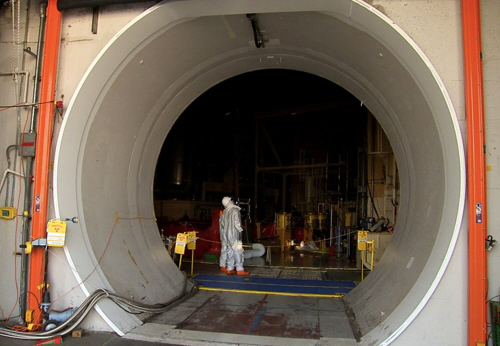| Indian Point | ||
| With Great Power Comes Great Responsibility | ||

|
||
| Review by Ross Anthony | ||
|
A powerful, relevant, and timely look at an aging nuclear power plant that is currently running on an expired license. Filmmakers follow: 1) A few interesting local protesters. 2) The embattled chairperson of the commission that's supposed to regulate the nuclear industry. 3) The chipper control room operator who praises the plant. With shots from inside the plant, including the fusion pool, these filmmakers obtain amazing access. The film is always engaging, though in the middle, the back and forth between protesters and powers-that-be feels a bit cyclic rather than progressive. (I'm sure it feels much more so for those involved.) In sum, it's an important documentary that should be watched by anyone who lives on this particular planet. The director's statement is equally thoughtful and well put, so I'll include it here (from the press notes). My goal with this film is to present a story of great complexity through the people who are most invested in this industry – the owners of the plant, the workers at the plant and the activists who want to shut it all down. By focusing on one nuclear power plant during it’s dramatic struggle to remain viable, I believe we can gain a deeper understanding of the greater issues and questions that plague the world re: how to safely provide energy. Going inside Indian Point was essential to me, it drove my curiosity and as a filmmaker I try to bring that curiosity to the screen believing that audiences too want to see inside, and know who works there and what they do there, all day, every day. This is not a film about whether nuclear power is good or bad. As the repercussions of the 2011 Fukushima Daiichi disaster continue to unfold, the relevant questions to me are: do we continue operating aging plants, especially one like Indian Point which is situated in the middle of the largest population of any nuclear power plant in the nation, and if so, who or what organization will make sure these plants are run safely? This is a film that welcomes all perspectives, voices from all sides of the issue, especially those who work at the plant and who are often overlooked in this debate. What is this grand bargain we’ve made with ourselves to power the world and how can we make sure it doesn’t destroy us? It’s a huge question and one best told through the lens of one plant and the handful of characters that care what happens to it. – Ivy Meeropol |
||
|
||
|
Grade..........................B+ (2.5/4) |
||
|
|
||
|
||
|
Copyright © 1998-2023 Ross Anthony, Author - Speaker - Solo World Circumnavigator In addition to reviewing films and interviewing celebs at HollywoodReportCard.com, traveling the world, composing great music, motivational speaking, Mr. Anthony also runs his own publishing company in the Los Angeles area. While traversing the circumference of the planet writing books and shooting documentaries, Mr. Anthony has taught, presented for, worked &/or played with locals in over 30 countries & 100 cities (Nairobi to Nagasaki). He's bungee-jumped from a bridge near Victoria Falls, wrestled with lions in Zimbabwe, crashed a Vespa off a high mountain road in Taiwan, and ridden a dirt bike across the States (Washington State to Washington DC). To get signed books ("Rodney Appleseed" to "Jinshirou") or schedule Ross to speak check out: www.RossAnthony.com or call 1-800-767-7186.
Go into the world and inspire the people you meet with your love, kindness, and whatever it is you're really good at. Check out books by Ross Anthony. Rand() functions, Pho chicken soup, rollerblading, and frozen yogurt (w/ blueberries) also rock! (Btw, rand is short for random. It can also stand for "Really Awkward Nutty Dinosaurs" -- which is quite rand, isn't it?) Being alive is the miracle. Special thanks to Ken Kocanda, HAL, Jodie Keszek, Don Haderlein, Mom and Pops, my family, R. Foss, and many others by Ross Anthony. Galati-FE also deserves a shout out. And thanks to all of you for your interest and optimism. Enjoy great films, read stirring novels, grow. |





